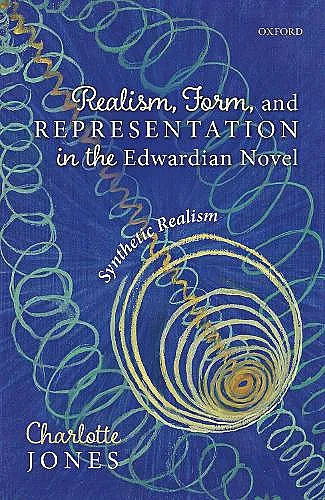Realism, Form, and Representation in the Edwardian Novel
Synthetic Realism
Format:Hardback
Publisher:Oxford University Press
Published:7th Jan '21
Should be back in stock very soon

The real represents to my perception the things that we cannot possibly not know, sooner or later, in one way or another', wrote Henry James in 1907. This description, riven with double negatives, hesitation, and uncertainty, encapsulates the epistemological difficulties of realism, for underlying its narrative and descriptive apparatus as an aesthetic mode lies a philosophical quandary. What grounds the 'real' of the realist novel? What kind of perception is required to validate the experience of reality? How does the realist novel represent the difficulty of knowing? What comes to the fore in James's account, as in so many, is how the forms of realism are constituted by a relation to unknowing, absence, and ineffability. Realism, Form, and Representation in the Edwardian Novel recovers a neglected literary history centred on the intricate relationship between fictional representation and philosophical commitment. It asks how--or if--we can conceptualize realist novels when the objects of their representational intentions are realities that might exist beyond what is empirically verifiable by sense data or analytically verifiable by logic, and are thus irreducible to conceptual schemes or linguistic practices--a formulation Charlotte Jones refers to as 'synthetic realism'. In new readings of Edwardian novels including Conrad's Nostromo and The Secret Agent, Wells's Tono-Bungay, and Ford's The Good Soldier, this volume revises and reconsiders key elements of realist novel theory--metaphor and metonymy; character interiority; the insignificant detail; omniscient narration and free indirect discourse; causal linearity--to uncover the representational strategies by which realist writers grapple with the recalcitrance of reality as a referential anchor, and seek to give form to the force, opacity, and uncertain scope of realities that may lie beyond the material. In restoring a metaphysical dimension to the realist novel's imaginary, Realism, Form, and Representation in the Edwardian Novel offers a new conceptualization of realism both within early twentieth-century literary culture and as a transhistorical mode of representation.
Charlotte Jones's book makes a rich contribution to a revivified critical discourse around literary realism by examining the philosophical import and aesthetic ambitions of an undertheorized period of the British novel. * Adam Grener, Modern Language Review *
Charlotte Jones's book is very much to be welcomed as a major contribution to the growing number of studies that have recently come to recognize Arnold Bennett's importance in the development of early twentieth-century literature. * John Shapcott *
Jones's study is replete with thought-provoking analytical perspectives. It succeeds in establishing a fruitful dialogue between philosophy and literature, which remains accessible throughout as Jones does not hesitate to provide useful recaps which never hinder the tempo of the argument... * Georges Letissier, Cercles *
ISBN: 9780198857921
Dimensions: 240mm x 165mm x 22mm
Weight: 592g
336 pages